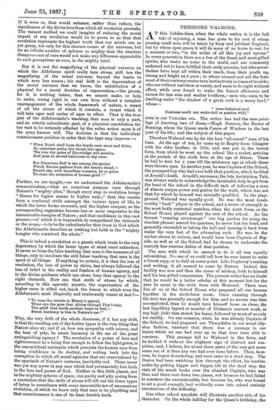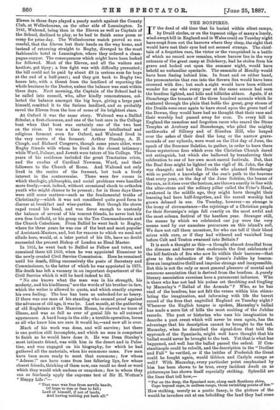THEODORE WALROND.
AT this Jabilee-tiine, when the whole nation is in the full tide of rejoicing, a man has gone to his rest of whose passing small note will be taken by busy and jubilant England, but by whose open grave it will do none of us harm to rest for a moment or two, "in the midst of all this joy and uproar." In every generation there are a few of the finest and most gifted spirits, who make no noise in the world, and are commonly reckoned not to have fulfilled their early promise, but who never- theless have kept all within their reach, from their youth up,- strong and bright an d pure ; to whose counsel and aid the fore- most of their contemporaries turn instinctively in times of trouble; who are without ambition or vanity, and seem to do right without effort, while ever found to make the fairest allowance and excuse for less wise and weaker brethren,—men who seem to be dwelling under "the shadow of a great rock in a weary land," whose-
" even-balanced soul Business could not make dull or passion wild,"
even in our Victorian era. The writer has had the rare privi- lege of knowing two of these,—Hugh Pearson, the Rector of Sonning, whom the Queen made Canon of Windsor in the last year of his life; and the subject of this paper.
Theodore Walrond was by far the best "all-round" man of his time. At the age of ten, be came up to Rugby from Glasgow with his elder brother, in 183t, and was put in the lowest form, from which he went up the school like a rocket, arriving at the portals of the sixth form at the age of fifteen. There he had to wait for a year till the minimum age at which these were thrown open. In another year, he was Captain of the School, the youngest boy who had ever held that position, which he filled at Arnold's death. Arnold's successor, the late Archbishop Tait, was always ready to acknowledge the invaluable help begot from the head of the school in the difficult task of following a man of almost unique power and genius for the work, which was not that for which he himself was specially qualified. In the play- ground, Walrond was equally good. He was the most trust- worthy "back" player in the school, and a tower of strength in the most hotly contested matches, when the sixth form, or the School House, played against the rest of the school. As the fiercest "running scrummage" (we beg pardon for using the obsolete phrase) neared his quarters, he never lost his bead, and generally succeeded in taking the ball and turning it back from under the very feet of the advancing rush. He was in the cricket eleven at sixteen, and would have been Captain of Big. side, as well as of the School, had he chosen to undertake the scarcely less onerous duties of that position.
The ease with which he seemed to do it all was equally astonishing: No one of us could tell bow he ever learnt to write a Greek copy, or to field at cover-point. Like Dogberry's reading and writing, it all seemed to come by Nature. Indeed, this facility was now and then the cause of mishap, both to himself and his less gifted companions. The present writer has no doubt that he would be a better scholar at this moment but for the year he spent in the sixth form with Walrond. There were five of us at the School House who prepared all our lessons together in the sixth-form room. Once running through the text was generally enough for him, and no sooner was that accomplished, than he would turn himself loose on chess, the last Ingoldsby legend or number of Dickens's current work, or any high jinks that struck his fancy, followed by most of us only too readily. On one occasion, when he was already Captain of the School, we had prepared our Thncydides in our usual slip. slop fashion, unaware that there was a passage in our lesson which no one had ever up to that time been able to construe. This passage fell to Walrond in the form, and he tackled it without the slightest sign of distrust and sus- picion, and, I believe, for about three parts of the way got more sense out of it than any one had ever done before. Then, how- ever, he began floundering, and soon came to a dead stop. The Doctor had been watching him through the effort, his terrible under-lip getting bigger and bigger, till at the dead stop the vials of his wrath broke over the abashed Captain, who was then and there sent down two places, not because he had failed to construe the unconstruable, but because he, who was bound to set a good example, had evidently come into school entirely unconscious of the difficulty.
One other school anecdote will illustrate another side of his character. On the whole holiday for the Queen's birthday, the Eleven in those days played a yearly match against the County Club, at Wellesbourne, on the other side of Leamington. In 1841, Walrond, being then in the Eleven as well as Captain of the School, declined to play, as he had to finish some poem or essay for prise. day. The Wellesbourne match proved so suc- cessful, that the Eleven lost their. heads on the way home, and instead of returning straight to Rugby, diverged to the most fashionable hotel in Leamington, where they ordered a cham- pagne-supper. The consequences which might have been looked for followed. Most of the Eleven, and all the waiters and hostlers, got tipsy ; a free fight was with difficulty prevented; the bill could not be paid by about £8 (a serious sum for boys at the end of a half-year) ; and they got back to Rugby two hours late, with a threat from the landlord of reporting the whole business to the Doctor, unless the balance was sent within three days. Next morning, the Captain of the School had to be called into council, who, after kindly remonstrance, col- lected the balance amongst the big boys, giving a large part himself, remitted it to the furious landlord, and so probably saved the Eleven from the loss of some of its brightest stars.
At Oxford it was the same story. Walrond was a Balliol Scholar, a first-classman, and one of the best oars in the College boat when that boat was certainly one of the two best on the river. It was a time of intense intellectual and religious ferment even for Oxford, and Walrond lived in the very centre of the ferment. Arthur Stanley, A. H. Clough, and Richard Congreve, though some years older, were Rugby friends with whom he lived in the closest intimacy ; while Ward, Palmer, and Jowett were tutors of his College. The years of his residence included the great Tractarian crisis, and the exodus of Cardinal Newman, Ward, and their followers to the Church of Rome. And Walrond not only lived in the centre of the ferment, but took a lively interest in the controversies. There were few rooms in which theologic, philosophic, and social problems were handled more freely,—not, indeed, without occasional shock to orthodox youth who might chance to be present ; for in those days there were still some matters—such as the fundamental truths of Christianity—which it was not considered quite good form to discuss at breakfast and wine-parties. But though the storm raged round his head, and was fierce enough to unsteady the balance of several of his nearest friends, he never lost his own firm foothold, or his grasp on the Ten Commandments and the Church Catechism. From Balliol be went back to Rugby, where for three years he was one of the best and most popular of Assistant-Masters, and, but for reasons to which we need not allude here, would, at a later period of his life, have no doubt succeeded the present Bishop of London as Head Master.
In 1851, he went back to Balliol as Fellow and tutor, and remained there till 1856, when he was appointed Examiner to the newly created Civil Service Commission. Here be remained until his death, filling successively the posts of Secretary and Commissioner, to the latter of which he was appointed in 1875. His death has left a vacancy in an important department of the Civil Service which it will be hard indeed to fill.
"No one knows what the man was in his strength, his modesty, and his kindliness," are the words of his brother-in-law, which the writer is allowed to quote, and which exactly express his own feeling. The loss has been as unlooked-for as heavy. If there was one man of his standing who seemed proof against the advances of old age, it was he. Last month, at the gathering of old Rugbeians at the Mansion Home, he showed no trace of illness, and was as full as ever of genial life to all outward appearance. A hard lump in the side; a terrible operation, borne as all who knew him are sure it would be,—and now all is over.
Much of his work was done, and will survive; but there is one portion still incomplete, and which no man is competent to finish as he would have done it. He was Dean Stanley's most intimate friend, was with him in the desert and in Pales- tine, and was engaged on his biography, for which he had gathered all the materials, when his summons came. Few men have been more ready to meet that summons ; few whose " A.dsum l" can have come from less faltering lips, few whose closest friends, thinking of them now, can recall no deed or word which they would wish undone or unspoken; few to whom they can so fearlessly apply the suprsme test of Sir H. Wotton's " Happy Life :"— " That man was free from servile bandy, Of hope to rise or fear to fall; Lord of himself, if not of lands, And having nothing yet hath all."



































 Previous page
Previous page